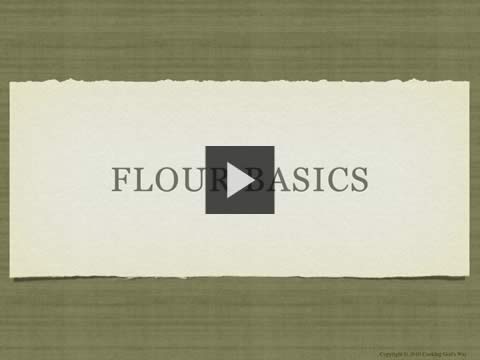| [wp_eMember_compact_login] |
<< Back to eCourse Lesson Menu |
Grains can be a good addition to ones diet, so long as they are the “right” kind of grains AND they are prepared properly.
– Worst Flour Types
Enriched / White Flour – White flour has been stripped of all the nutrients in processing. They then “enrich” the flour by adding back in synthetic vitamins and minerals. These minerals are not easily recognized and used by the body because they are not natural.
Whole Wheat Flour – “Traditional” Whole Wheat flour has been hybrid over the years to increase grain yield, quality, disease and insect resistance. This is bad news, I know…but do not be alarmed, we will cover some easy replacements for typical whole wheat flour further down this page.
Corn Meal or Four – Store-bought corn meal or corn flour (Masa) can go rancid quickly, even on store shelves, and is usually genetically modified. If you are going to use corn meal in your diet, use it only on occasion and not as a staple. Also look for organic corn meal that is non-gmo and purchase from a sore that you know has a high turn-over rate.
“A diet high in “refined” white flour increases the risk of heart disease.”
– Best Flour Types
Spelt – Spelt is an ancient grain that traces its heritage back long before many wheat hybrids [WHFoods]. It is available today in most health stores and/or local higher-end markets, and it is usually affordable in price. Spelt flour is also available at Amazon.com Spelt flour can be used anywhere you would normally use whole wheat flour.
Emmer – Emmer is another, even older, ancient form of wheat. It is also sometimes known as “Farro”, was spoken about in the Bible, and used as a staple grain in ancient Egypt. Emmer can be used like “whole wheat” flour, but is a little hard to find and more expensive than Spelt.
Since Spelt & Emmer have not been inbred like their “wheat” cousins, they can sometimes be enjoyed by those that typically have “wheat” sensitivities. (NOTE: If you have wheat sensitivities, intolerance’s, and/or allergies – please do not try Spelt or Emmer unless under the direction of your Physician/Naturopath, etc.)
Other Healthy Grain Options
- Rye
- Kamut
- Barley
- Oats
- Coconut Flour*
- Nut Flours* (homemade)
- Brown Rice
- Buckwheat*
- Millet*
- Quinoa*
- Teff*
- Amaranth*
* = gluten-free
Grains Must Be Prepared Properly for the Best Health and Nutrition!
Okay so now you know which grains (flour types) to avoid and which ones are better for your health. But, to get the most out of your grains, you need to prepare them properly.
You can read more about how to do this in Part 2 of this Lesson: Properly Preparing Grains.
Don’t forget to share what impressed or surprised you in this lesson by leaving a comment below.




Eating better “grains” has so many advantages…now to be careful when buying and eating them.
Thanks for the reminder that flours can go rancid on the shelves of the store. I want to buy a grain mill, SOON!
I use pastry flour(white whole wheat flour) So according to your information I should stop using this flour even if it is organic, and we soak the flour before using? Then what flour do you use to get a nice light loaf of bread?
We’re not saying to stop using the pastry flour. I guess it all comes down to how often you’re eating it. All grains (flours) should be eaten in moderation. Since all grains cause some inflammation in the body it is wise not to over-do it. I couldn’t really tell you about the bread since we do not eat much of that around here. I tend to make “flat breads” or english muffins using a sourdough process when we want a little “bread”.
Does organic mean GM-free? Like corn? Does it apply to wheat? Rice is on the list of GM foods. Is brown rice the same or not?
Organic means non GM most of the time. To be labeled organic from the USDA, (little green symbol) it is not supposed to contain any GM product. But if there are not any non GM versions of the ingredient available then they allow it to be labeled as organic. Now this is really an untruth. This is where you will have to do your research. Watch how things are named. I saw an item in the store that was named natural whatever, I looked at the ingredients and there was chemical and artificial ingredients, guess they thought they were all natural chemicals. Learn to read labels is the best advice I can give. – Jeff
What about organic Whole Wheat? Is it as bad for you as regular?
The big issue with grains is that they convert easily to sugar on digestion, even whole wheat. Yes organic whole wheat has less pesticide issues, which is a good thing. Limiting your grains can help to reduce sugar intake, which helps to lower inflammation in the body. – Jeff
Yeah, I just got a new lesson on inflammation. I remember God mentioned inflammation in the Old Testament as one of the many curses. But what to eat then? Milk is bad (goat’s milk is not affordable), meat is bad, grains are bad :-). You will not survive on veggies and fruits alone besides they are full of pesticides so you cannot eat them unlimited either. I am getting a little discouraged. Also do you know when did they start making genetically modified wheat? Just recently or for years?
I understand it can all be overwhelming and become a bummer, future lessons do give guidance on healthy meats, dairy, and grains. We have to face a fact, there is no way to escape all pollution and corruption of foods. That does not mean give up! We do the best we can with what we have and move forward. The great thing is that God did create our bodies to self-detox and heal. Even DNA can heal with proper nutrition, notice I said proper not perfect. Raw milk and grassfed beef are healthy (lesson 7), some grains are acceptable in moderation along with proper preparation, do review lesson 3. Do keep moving forward in the lessons :).
GMO wheat has been around for years, so you will have to go with one of the alternative grains. – Jeff
Thank you, Jeff. It is awesome that I can get the feedback from you. I did not get to the lesson 7 but it seems like all beef is injected with antibiotics and hormones. Also what about bacteria in the raw milk and cheese? By the way I cannot find the information anywhere if the cream cheese is natural or processed?? So does that really mean that if I have been eating not so healthy (to say the least) for 27 years, I can reverse the damage that has been done? Sorry for so many questions. When I soak my grains, will soaking remove some of the nutrients or not at all?
Glad to give you a hand with the new path you are starting. I ate bad for near 40 years and now I am in the best heatlh of my life. Yes you can reverse the bad choices, keep it real and understand there will be some quick paybacks, while others will take years to work on. Every year I see better results.
Here is a link to read and study many of your questions. Nutrition & Food Index.
thanks – Jeff
Is it ok to buy sourdough or sprouted bread in the health food store?
These items will never be the quality you will get when doing it yourself. Health is a hands on operation, you will get as much as you take personal ownership for. – Jeff
The information about the whole wheat was new to me, but the only grain we use a good amount of are oats. The list at the end of the video was helpful for more good grains. Have you seen the glutten free oats. Eactly how is that done? Just curious.
Oats are a gluten free grain by nature. It’s just that most oats cannot be labeled “gluten-free” because they are processed in facilities that handle wheat, thus possibly cross-contaminating them with gluten residue. Certified gluten-free oats cost a lot more.
Aaahhh! I had no idea about the whole wheat being genetically modified, although I shouldn’t be surprised. Guess I’ll be looking into spelt.
I love the quality information on this site AND that it includes God.
Wow I always thought that whole wheat was the way to go.
Nita_o3, All grains do digest to sugar in time, it is just a question of what comes with it (vitamins, minerals, etc.). Grains need to be a much smaller part of nutrition than they are today. Treat grains like sweets, keep them very restricted. – Jeff
I have used spelt for some time now. I have several friends and family members that can not have wheat, but can have spelt. I find though that spelt is not the exact same as wheat and is hard to use. It will rise, but then fall after being cooked (at least that is what happens for me). I am sure I need to experiment more, but it’s not what I call a cheap grain and so it’s hard to experiment with it.
What about a replacement for corn meal? I love grits, polenta, and corn bread.
I know what you mean about Spelt. In baking with it does take some getting used to. Because it does act differently than wheat, but I have not had the issue with the falling part. I have actually gotten used to it and now hate using “whole wheat” flour….I had to use some the other day and it was not behaving how I wanted it to (because I’m so used to Spelt). I sometimes grind my own Spelt flour and sometimes just buy it at Amazon in bulk. Since grains should be a limited part of ones diet anyways I think the price is pretty reasonable. There are many recipes here on Cooking God’s Way that use Spelt, so feel free to give them a try and let me know how they work out for you.
As far as replacements for corn meal, there really are none. But eating corn meal is not a problem as long as you eat it in moderation…not everyday. Choose organic cornmeal and “soak” it for best digestion.
For more info on why corn should not be a staple in one diet, read the following article The History of Corn & Vitamin B Deficiency (Pellagra).